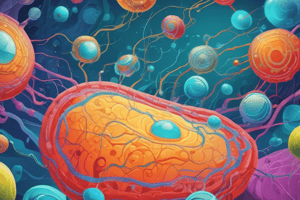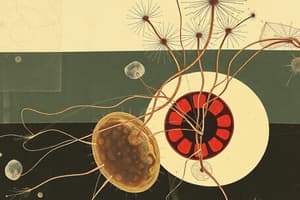Podcast
Questions and Answers
Exocytosis is a process by which cells:
Exocytosis is a process by which cells:
- Release substances from the cell via carrier proteins.
- Bring in substances from the outside via vesicles.
- Bring in substances from the outside via pores in the cell membrane.
- Release substances from the cell via vesicles. (correct)
- Release substances from the cell through pores in the cell membrane.
Certain white blood cells engulf microorganisms and bring them in to digest them. This process is best described as:
Certain white blood cells engulf microorganisms and bring them in to digest them. This process is best described as:
- Diffusion.
- Pinocytosis.
- Receptor-mediated exocytosis.
- Phagocytosis. (correct)
- Osmosis.
Which of the following statements about receptor-mediated endocytosis is TRUE?
Which of the following statements about receptor-mediated endocytosis is TRUE?
- It is used to transport material out of the cell.
- It is not specific.
- It involves clathrin-coated pits. (correct)
- It involves transport of material into the cell through pores in the cell membrane.
- None of the above.
If the material the cell takes in is liquid, the process is termed pinocytosis.
If the material the cell takes in is liquid, the process is termed pinocytosis.
Low-density lipoprotein is brought into the cell by receptor-mediated endocytosis.
Low-density lipoprotein is brought into the cell by receptor-mediated endocytosis.
Simple diffusion is defined as the movement of:
Simple diffusion is defined as the movement of:
When sugar is mixed with water, equilibrium is reached when:
When sugar is mixed with water, equilibrium is reached when:
The rate of diffusion is affected by which of the following?
The rate of diffusion is affected by which of the following?
The molecules in a solid lump of sugar do not move.
The molecules in a solid lump of sugar do not move.
Diffusion is one of the processes whereby materials are exchanged between a cell and its environment.
Diffusion is one of the processes whereby materials are exchanged between a cell and its environment.
Facilitated diffusion requires:
Facilitated diffusion requires:
Facilitated diffusion occurs:
Facilitated diffusion occurs:
Facilitated diffusion is used to transport:
Facilitated diffusion is used to transport:
Unlike simple diffusion, facilitated diffusion requires energy expenditure by the cell.
Unlike simple diffusion, facilitated diffusion requires energy expenditure by the cell.
Facilitated diffusion requires a specific transporter for a specific molecule.
Facilitated diffusion requires a specific transporter for a specific molecule.
Osmosis is best defined as the movement of:
Osmosis is best defined as the movement of:
Which of the following will pass through a cell membrane most easily?
Which of the following will pass through a cell membrane most easily?
A red blood cell placed in a hypertonic medium will:
A red blood cell placed in a hypertonic medium will:
A 5% urea solution is hypotonic to a 10% urea solution.
A 5% urea solution is hypotonic to a 10% urea solution.
If a cell is placed in an isotonic medium, there will be no net movement of water.
If a cell is placed in an isotonic medium, there will be no net movement of water.
The sodium-potassium pump functions to pump:
The sodium-potassium pump functions to pump:
What is the source of energy used to power the sodium-potassium pump?
What is the source of energy used to power the sodium-potassium pump?
During one cycle, the sodium-potassium pump binds and moves:
During one cycle, the sodium-potassium pump binds and moves:
The sodium-potassium pump is a trans-membrane protein.
The sodium-potassium pump is a trans-membrane protein.
The binding and release of sodium or potassium ions are due to conformational changes in the protein.
The binding and release of sodium or potassium ions are due to conformational changes in the protein.
Flashcards are hidden until you start studying
Study Notes
Exocytosis and Endocytosis
- Exocytosis releases substances from cells via vesicles, rather than through membrane pores or carrier proteins.
- Phagocytosis is the mechanism used by white blood cells to engulf and digest microorganisms.
- Receptor-mediated endocytosis specifically requires clathrin-coated pits to transport materials into the cell.
Types of Diffusion
- Pinocytosis refers to the uptake of liquids by cells.
- Low-density lipoprotein (LDL) enters cells through receptor-mediated endocytosis.
- Simple diffusion occurs as molecules move from areas of higher concentration to lower concentration, facilitated by factors such as temperature and molecule size.
Equilibrium in Solutions
- Equilibrium is achieved when dissolved sugar molecules are evenly distributed in water.
- The rate of diffusion is influenced by temperature, size of molecules, and steepness of concentration gradients.
Facilitated Diffusion
- Facilitated diffusion utilizes carrier proteins and does not require energy expenditure, differing from active transport mechanisms.
- This process can transport sugars and amino acids in either direction based on concentration gradients.
Osmosis and Water Movement
- Osmosis is the movement of water molecules across a membrane from areas of high to low water concentration.
- Small nonpolar molecules easily pass through cell membranes, while larger or polar molecules face more difficulty.
Cell Reactions to Tonicity
- A red blood cell in a hypertonic solution will shrink due to water moving out.
- Solutions with different concentrations, such as a 5% urea solution being hypotonic to a 10% solution, can affect cell volumes.
- Cells in an isotonic medium experience no net movement of water.
Sodium-Potassium Pump
- This pump actively transports sodium ions out of the cell and potassium ions into the cell, powered by the breakdown of ATP.
- During each cycle, it moves 3 sodium ions out and 2 potassium ions in, changing conformation to bind and release these ions effectively.
- The sodium-potassium pump is a trans-membrane protein essential for maintaining cellular ion gradients.
Studying That Suits You
Use AI to generate personalized quizzes and flashcards to suit your learning preferences.




